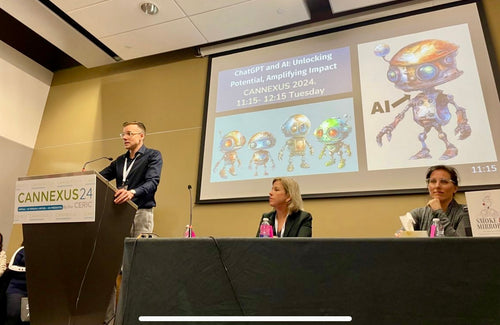I had the pleasure of presenting with JP Michel at Cannexus24 to both share and learn ways in which we can scale career development by creating faculty champions. With a room full of inspired career professionals, we got curious and asked what obstacles do you hear, when you engage faculty in the topic of Career, the responses we heard included:
-
I don’t have time
-
It’s not my job
-
I don’t know anything about Careers; it’s not my area of expertise
-
That’s up to the students. Its none of my business
-
What I teach doesn’t relate to careers
-
I have a hard enough time getting them to learn what I need them to learn
Then we asked, what if you could help solve these problems, what would be different, for career professionals, students, faculty, and employers? My heart was full hearing their collective vision for career integrated learning in Higher Ed:
-
Students would feel less anxious if career exploration wasn’t so mysterious
-
Faculty would discover they already bring career into the classroom through skill practice and discussion of problems needing solved
-
Employers would have more confident, skill-aware candidates
-
Student conversations with career professionals would have more depth, more purpose
-
Higher Ed could engage in measuring the process of career development and learn, not guess, what students, faculty and employer needs truly are
-
Students could learn to work with uncertainty and prepare for a VUCA world
-
We could reduce career equity issues, thus increasing talent for the labour force
To scale career and bring beautiful visions like these to life requires a shift in how we approach faculty, one that is supportive, not prescriptive, of the obstacles they face. The following are three learnings that shifted my approach as a Career Advisor, to faculty engagement. These small approaches have fostered unexpected partnerships, projects that scale, and solutions to problems uncovered.
Lead with Curiosity; Listen to Understand and Uncover Obstacles
Socializing the Challenge mindset allowed me to get curious when engaging faculty. Leading with curiosity (rather than suggesting career workshops), I began to listen to understand, and uncover obstacles, I could then offer solutions for. During conversations with the College Recruitment Manager for the College of Arts, we discussed if a career presence in the college would attract applicants. The conclusion, parents want to know the system is supporting their student in exploring and planning a career path for graduation, this is their ROI in their student. This sparked the idea to build Art Career Space a career development web resource embedded in the College of Arts website. This self-serve tool provides a road map to career exploration through the challenge mindset, and how to leverage opportunities during an academic career to begin the process of identifying, building and navigating a career pathway.
Use the Word "Career" as Little as Possible
At the University of Guelph, the Challenge mindset approach to career exploration has empowered career and experiential learning professionals to engage faculty in conversations about career without having to use the word career. Career has become a trigger word for busy overwhelmed faculty. Alternatively, when we discuss problems to work on in the world, such as current issues introduced in the classroom or the applications of faculty’s research, we can discuss the world of work without having to use the word career. This approach is more relatable and frees everyone from needing to name job titles that match disciplines.
Tools like the challenges cards and the United Nation's Sustainable Development Goals help faculty reflect on problems their knowledge domains contribute solutions to. Challenge mindset tools like these have led to opportunities that facilitate career development processes through assignments. For example, a sustainability management course has curated and embed sustainably cards from the challenge card deck into a group assignment. The group discusses and selects their challenge from this curated deck and they research organizations working on their sustainability issue. They then must discuss and decide on one organization to complete a SWAT analysis. Serendipitously this process parallels the steps of labour market research through an organizational deep dive on meaningful problem to work on.
Connect Solutions to Obstacles
The Arts and Science program is interdisciplinary, requiring a minor in both the arts and the sciences. These students can explore careers combining their unique discipline pairings. The program coordinator and I built a rapport over several discussions about the difficulties of exploring non-linear pathways without tools and know how. So, we piloted a virtual conference focused on the aspects of exploring and building a career, as part of their academic career. This 100% virtual initiative is now fully embedded in this program, has had 6 rotations, with an attendance of 350+ for each conference. Themes have included career wayfinding, EDI, Technology in the workplace, and further education options. There is a library of 30+ recordings used to complete a graded reflection assignment and recently we secured a research grant to examine the attitudes of students and faculty who have participated in this integrated career preparation pilot.
I hope what you have read has inspired something for you. Sit for a moment and consider how could you shift the way you engage faculty? What are 1-3 steps you will take to move you forward on this shift?
Have questions or an idea you would like to chat about? Always happy to share and learn with you. You can reach out through LinkedIn or naedward@uoguelph.ca
--
Nicola Edwards
I arrive with passion in my heart, tools and ideas in my chest and a Let’s Go energy to bring career to the College of Arts. You see I am an Arts grad, and I believe are the interdisciplinary pollinators of the world of work. These deep thinkers begin slow and work diligently to build structure that will harvest gold over and over again.



